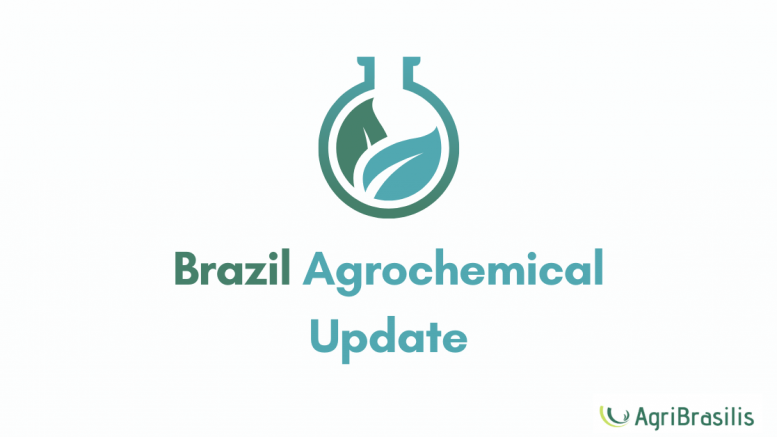Brazil Agrochemical Update
- In compliance with court decision, Anvisa approves toxicological evaluation of the pesticides chlorothalonil + difenoconazole + trifloxystrobin (Partner); abamectin (Sinon); trinexapaque-ethyl (Tecnomyl); S-metolachlor (Rainbow); and abamectin + spirodiclofen (Cropchem). (Anvisa)
- Vittia Fertilizantes profits US$ 1.03 million in the 2Q of 2022, reverting a loss of US$ 760 thousand in the previous year. Result is attributed to revenue growth. Biological inputs continue to be the company’s focus. (Vittia Fertilizantes)
- Fertilizer imports from Canada reach US$ 5 billion between January and June 2022, that represents an increase of 63% compared to the previous year. (Brazil-Canada Chamber of Commerce)
- Petrobras offers for sale potash mining rights in the Amazon basin, with potential equivalent to 6% of current global production. Moment of scarce supply and high exploration costs justify the decision. Assets include eight potassium salts mining concessions, four mining solicitations and 22 mining titles in process of obtaining research authorization. (Petrobras)
- Fertilizantes Heringer creates committee to investigate fraud in service contracts. Due to the investigation, disclosure of company’s second quarter balance sheet was postponed. (Fertilizantes Heringer)
- Coopercitrus announces fundraising of US$ 34.8 million in loans to finance purchase of agricultural inputs carried out by its cooperative members. Investment is supported by the Loan Market Association. (Coopercitrus)
- Marcelo Altieri is the new president of Yara Brasil. Executive was vice president of operations of the company in Latin America. (Yara Brasil)
- ICL América do Sul, Tera Ambiental, Stoller, Brandt do Brasil and Superbac welcomed Abisolo’s delegation in an Intelligent Productivity caravan with members from MAPA, Confert and the Federal Government. The purpose of the event was to show the potential of the special fertilizer sector in a cycle of visits to the industries that took place between the 25th and 28th of July. (Abisolo)
- Fertilizer hub at the Palmeirante Integrator Terminal, State of Tocantins, initiates production tests. Structure is already 70% complete, with a railway loop, railways, unloading and storage hopper with capacity for 60 thousand tonnes. (VLI)
- 24 thousand L of counterfeit pesticides will be incinerated. Products were seized in a PRF and MAPA task force that happened in the State of Mato Grosso. (Ministry of Agriculture)
- Published by CNPq and Ministry of Science, Technology and Innovation a public call of US$ 7.2 million for bioinputs. Resources are from the National Fund for Scientific and Technological Development. Proposals should be submitted by September 8th, 2022. (MCTI; CNPq)
- Electrostatic spray nozzle can reduce by 50% the need of pesticide active ingredients in crop applications. Developed by Embrapa Meio Ambiente, technology uses induction electrification, that
increases deposition of pesticide droplets on targets. (Embrapa Meio Ambiente) - Aguia Fertilizantes presents additional information on request for an installation license at
Fepam, the State Environment Preservation Foundation, regarding the project in Lavras do Sul, State of Rio Grande do Sul. It is expected to start operations within 12 months after the license is granted, with an annual production capacity of 300 thousand tonnes of natural phosphate. (Aguia Fertilizantes) - Magnetic resonance imaging reduces nitrogen fertilizer losses. Research carried out by Embrapa Solos in partnership with the São Carlos Institute of Physics makes it possible to quickly and accurately determine hydraulic properties of soils and the effectiveness of anti-wetting agents, which are important for the urea clumping process. (Embrapa; IFSC-USP)
- Research uses artificial intelligence to verify presence of pesticides in food. Unicamp’s method was able to find chemical residues in tomatoes. The goal is to create portable equipment to be used in super markets. (Campinas State University)
- The Parliamentary Agricultural Front called for cancellation of the ban of fungicide carbendazim, through the Bill Legislative Decree 312/2022, claiming that this is one of the 20 most used products in Brazil. (FPA)
- Ascenza launches four new post-emergence herbicides and a physiological insecticide for soybeans. The objective is to have 20 new products until 2025. (Ascenza)
- Ademilson Villela is FMC Brasil’s new commercial director for sugarcane and specialties. Villela previously held the position of business director for the Southern Cone. (FMC Brazil)
- Seized 100 thousand L of products and 412 tonnes of fertilizers during inspection operation for the production of fertilizers in the state of São Paulo carried out by the Ministry of Agriculture, Livestock and Supply. (MAPA)
- Verde Agritech and Lavoro announce partnership to produce K Forte potassium fertilizer, aiming to reduce Brazil’s dependence on fertilizer imports. (Verde Agritech)

READ MORE:

